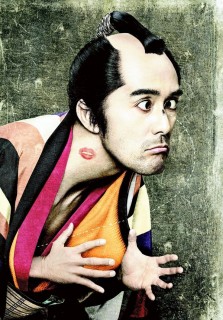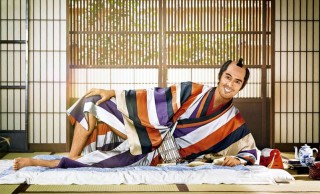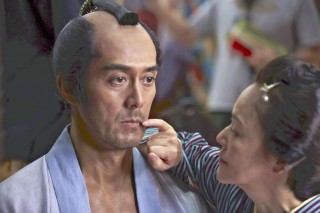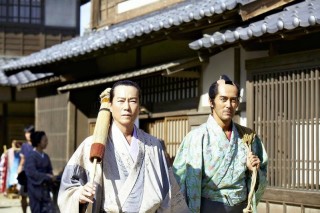Loading
Search
▼ Hiroshi Abe’s New Challenge: Leading Film Star Plays Elite Samurai Given Shocking New Job
- Category:Experience
Leading film star Hiroshi Abe goes all out in his latest movie, “Nomitori Samurai” (Flea-picking Samurai). He plays an elite samurai who makes a mistake and is punished by being ordered to pick fleas from pet cats, a job that actually existed during the Edo period (1603-1867). However, Abe’s character soon discovers that picking fleas is just a front — the employees are actually male prostitutes serving female customers.
In this film with a comical and partly erotic touch, Abe portrays a man who makes a serious effort to be good at this dubious profession.
A native of Kanagawa Prefecture, Abe was first active as a model while he was a student. Now 53, he’s played a number of prominent roles in films and TV dramas since becoming an actor, in productions such as “Aruitemo Aruitemo” (Still Walking), “Zakuro-zaka no Adauchi” (Snow on the Blades), “Thermae Romae,” the “Trick” drama series and “Shitamachi Rocket.”
His new film is mainly based on a few short stories written by Shigeo Komatsu (1931-2017). The production was the fulfillment of a long-held wish for director Yasuo Tsuruhashi, 78, who conceived the idea many years ago.
In this film with a comical and partly erotic touch, Abe portrays a man who makes a serious effort to be good at this dubious profession.
A native of Kanagawa Prefecture, Abe was first active as a model while he was a student. Now 53, he’s played a number of prominent roles in films and TV dramas since becoming an actor, in productions such as “Aruitemo Aruitemo” (Still Walking), “Zakuro-zaka no Adauchi” (Snow on the Blades), “Thermae Romae,” the “Trick” drama series and “Shitamachi Rocket.”
His new film is mainly based on a few short stories written by Shigeo Komatsu (1931-2017). The production was the fulfillment of a long-held wish for director Yasuo Tsuruhashi, 78, who conceived the idea many years ago.
“Nomitori Samurai” is set in the 18th century, when Tanuma Okitsugu had power as a senior official of the shogun. Protagonist Kobayashi Hironoshin, played by Abe, holds an important post at the treasury department of the Nagaoka domain in current-day Niigata Prefecture.
One day, he angers his daimyo master, played by Yutaka Matsushige, who assigns him the humiliating job of taking fleas off people’s cats. “You’ll live without honor from now on,” the daimyo tells him.
One day, he angers his daimyo master, played by Yutaka Matsushige, who assigns him the humiliating job of taking fleas off people’s cats. “You’ll live without honor from now on,” the daimyo tells him.
Hironoshin soon finds out what his real job is, but his first customer, a woman named Omine played by Shinobu Terajima, tells him he was terrible. Deeply shocked, he decides to learn the skills required for his new profession from Seibe, the number one playboy in Edo, played by Etsushi Toyokawa.
To switch from a serious-minded bureaucrat, Hironoshin colors his lips red and changes from formal kamishimo, the kimono version of a business suit for samurai, to wearing gaudy clothes. He then strolls with colleagues on the street to attract clients.
Some people may be surprised that the protagonist accepts such a drastic change in his life so calmly.
“He just tries to faithfully follow his master’s orders,” Abe said. “He honestly serves his master and tries to cope positively with even unreasonable things. He’s no different from today’s diligent company employees.”
To switch from a serious-minded bureaucrat, Hironoshin colors his lips red and changes from formal kamishimo, the kimono version of a business suit for samurai, to wearing gaudy clothes. He then strolls with colleagues on the street to attract clients.
Some people may be surprised that the protagonist accepts such a drastic change in his life so calmly.
“He just tries to faithfully follow his master’s orders,” Abe said. “He honestly serves his master and tries to cope positively with even unreasonable things. He’s no different from today’s diligent company employees.”
This makes sense. When corporate workers receive a written announcement of their transfer, they obediently move to new workplaces and do new jobs, even if their fields are not familiar to them. Whether in the Edo period or today, employed people need to persevere to make a living.
Hironoshin feels further humiliated when his first customer harshly complains about his poor skills. He soon gets over the shock, however, and starts earnestly learning how to please women.
“The setting itself is funny, so I thought I should just appear in those scenes without conveying anything,” he said. “I think I look very funny if I’m just standing there a little upset. I deliberately didn’t act very much.”
About performing in comedies, Abe said: “I like to see people laugh because it means their hearts are warm. Laughing is a spontaneous reaction I can easily notice, so I’m happy as an actor when people laugh at my performances.”
Although this film is a samurai drama, there are no sword fights. It depicts the lives of commoners, not samurai, and Hironoshin grows as a person with the support of those around him.
Hironoshin feels further humiliated when his first customer harshly complains about his poor skills. He soon gets over the shock, however, and starts earnestly learning how to please women.
“The setting itself is funny, so I thought I should just appear in those scenes without conveying anything,” he said. “I think I look very funny if I’m just standing there a little upset. I deliberately didn’t act very much.”
About performing in comedies, Abe said: “I like to see people laugh because it means their hearts are warm. Laughing is a spontaneous reaction I can easily notice, so I’m happy as an actor when people laugh at my performances.”
Although this film is a samurai drama, there are no sword fights. It depicts the lives of commoners, not samurai, and Hironoshin grows as a person with the support of those around him.
This work is an excellent depiction of Edo from a commoners’ viewpoint.
“The Edo people in the film are so warm and kind,” Abe said. “This makes this film refreshingly different from other period dramas.”
Abe can play a wide range of characters: serious, brave or comical. In a word, he has built up a stock of performing skills.
“That’s a problem in a way. If I get used to acting, it can spoil [my acting]. In fact, I’m fighting to prevent that,” he said. “To avoid getting used to acting, I make a point of always trying difficult things.”
He means he will not rely on his established skills, even though that’s easy. His stoic approach to his profession is reminiscent of the samurai.
“The Edo people in the film are so warm and kind,” Abe said. “This makes this film refreshingly different from other period dramas.”
Abe can play a wide range of characters: serious, brave or comical. In a word, he has built up a stock of performing skills.
“That’s a problem in a way. If I get used to acting, it can spoil [my acting]. In fact, I’m fighting to prevent that,” he said. “To avoid getting used to acting, I make a point of always trying difficult things.”
He means he will not rely on his established skills, even though that’s easy. His stoic approach to his profession is reminiscent of the samurai.
- June 6, 2018
- Comment (0)
- Trackback(0)






